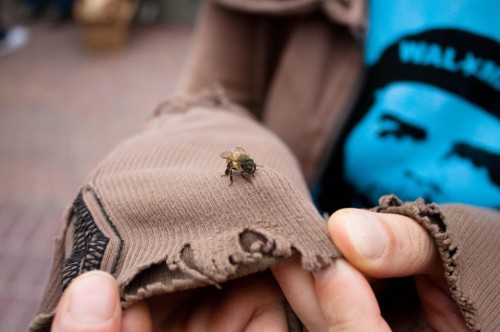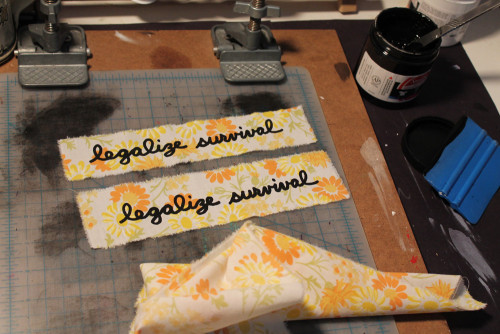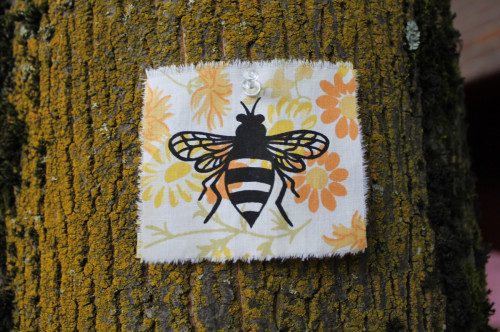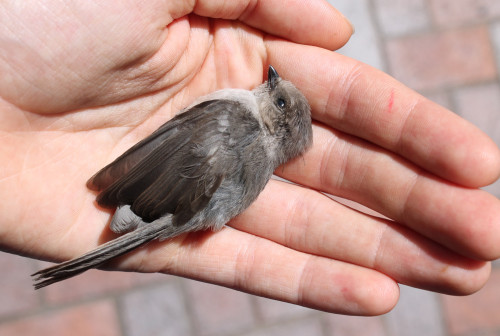Two summers ago, I was standing in the central plaza in Arcata, California, admiring some flowers when a small bee landed right on my wrist. I looked down and cautiously said hello, and the little bee looked up at me, and then turned around and made itself comfortable, literally nestling into the cuff of my coat. For the next hour or so, the bee stayed firmly planted on my cuff.
Prior to that moment, I had never interacted much with bees, and had always gone out of my way to give them respect, but more importantly their space. As a child, I had been badly stung on the inside of my cheek when a bee had landed on my lollipop as I was putting it into my mouth. My face swelled up and stayed that way for over a week, and my childhood peers taunted me endlessly over what had happened. I walked away from the incident resenting other children much more than I resented the bee, but nonetheless, from that point on, I was extremely cautious and wary whenever I saw a bee in my presence.
But when the bee landed on my wrist and decided to stay, I immediately felt obligated not only to host it, but to protect it as well. For the next hour or so, I went about my normal business, but completely aware at every second that there was a tiny little creature on my wrist, one that could sting me if it chose and one that I could crush if I wasn’t careful. Within that hour and in holding that balance, twenty years’ worth of fear and caution around bees completely melted away and transformed into a feeling of fear and caution out of concern for the bee itself. When the bee finally turned around, looked up at me again, and flew off, I was truly sad that it had left.
A few days later back in Oregon, I was at a gathering with friends in downtown Eugene’s Kesey Square when, once again, a bee landed on my cuff – on the other wrist this time. And, once again, it made itself comfortable and stayed for quite a while. The second time it landed on me, I noticed that the caution and fear that was usually present in my gut was absent. Instead, it was more akin to visiting with an old friend.
Another old friend of the human persuasion walked up to me at that moment and quickly snapped a picture of the bee on my cuff, expecting it to immediately fly away. He then stared at the bee incredulously upon realizing that it was staying put, looked up at me, and grinned.
“What are you, the bee whisperer?” he asked.

A bee on my cuff. Photo by Gregory Walker
I walked off with the bee for a moment for a little privacy, and then thanked the bee out loud for both the visit as well as for the lesson on fear from the first bee. A few minutes later, the bee flew away just as the first one did, but the bees definitively tagged me that day and never truly left me from that moment forward. Since that day, I constantly see bees; I regularly talk to bees. The bees have staked out a permanent place in my thought processes, and bees are a recurring theme in my dreams.
* * *
I found the sheet at a Goodwill in downtown Eugene, searching for patch material at a hurried moment during the beginning of the Whoville encampment last summer. It was a queen-size vintage bed sheet from the 60’s or 70’s, ivory-colored with yellow and orange flowers on it, and was a pink-tagged item that I happened to find on a day when the pink tags were half-off. Score, I said to myself.
As I walked to the register with the sheet, a wild-eyed homeless man started shouting loudly right outside the entrance on the sidewalk. As the cashier rang up my purchase, his screams became louder.
“Blessings and curses, loaves and fishes, loaves and fishes, blessings and doom,” he screamed, over and over, pointing a stick at passing cars. I left the store and, as I walked past him, he turned directly toward me. I froze and smiled at him. “FISHES!” he hissed at me, and immediately turned away. “DOOM” he then screamed at a passing car.
I’ll take fishes over doom, I thought to myself as I walked to my car.
I don’t know exactly where coincidence, enchantment, and belief intersected in this specific instance, but I slowly noticed, over the next few months, the vintage floral sheet, which I had paid less than two dollars for, seemed to multiply again and again. I printed series after series of patches, ripping strip after strip off the sheet, and every time I opened up the sheet again it seemed to be the same size as it had been the last time I ripped fabric from it.
I often have nicknames in my head for the different kinds of patterned fabric I buy, usually in reference to the design and/or color, especially when I have a large amount of any one print and it ends up hanging around for a while. The flowered bed sheet quickly became known as the “sheet of fishes”.

Patches from the sheet of fishes
* * *
I knew that I was dreaming and, yet, I couldn’t force myself awake. In the dream, I was hunched over a whirling pool of water, in a trance, staring into the abyss. Suddenly a spirit-woman appeared in the whirlpool. She opened her eyes at me, opened her mouth, and swarms of bees started to fly out. As they flew away, the spirit-woman started to rot away before my eyes, quickly turning to bones and decomposing flesh.
I suddenly snapped awake, my heart pounding. Death has never been a stranger, but themes and thoughts of dying and the underworld have been much more present in my dreams since being tagged by the bees. I looked at the clock. It was the middle of the afternoon and I had overslept by many hours. I made my way to the kitchen for some coffee and, as I fumbled with the machine, I heard my landlady talking loudly on the phone outside my window.
“Twenty-five thousand bees?” she said alarmingly. “How? What? How could that have happened?”
I immediately felt a knot grow in my stomach, and my thoughts went to the dream I had just snapped out of. I ran to my computer and quickly learned that there had just been a massive bee die-off that morning in Wilsonville, right outside of Portland. A landscaping company had accidentally sprayed neonicotinoid pesticides on linden trees, in violation of state regulations and labeling instructions, and as many as fifty thousand bees were dead or dying. Ironically, it was the first day of “National Pollinator Week,” which was designed to bring public awareness to the issues around pollination and bee deaths. News reports said that it was the largest known die-off in the United States.
Not knowing what else to do, I grabbed a piece of chalk, went downtown, and started drawing little bees on the sidewalk near Kesey Square, in the same place where the bee had visited me. At one point, a man stood over me as I drew, watching me carefully.
“They say we’ll be dead in four years if the bees disappear,” he said to me.
I looked up and nodded. “Most folks don’t understand what’s at stake,” I said.
He nodded in return. “Keep drawing those bees,” he said. “We need those kinds of conversation-starters. It’s the only way we’re ever gonna wake people up.”
I need to start printing bees, I thought to myself.
* * *
I finally sat down and drew the bee for a silkscreen last January, and it took me still a few months after finishing the first screen to realize that the “sheet of fishes” was the perfect fabric to complement the bee graphic. Not only in terms of the visual, but also in the spirit of multiplying and never running out. As soon as I printed the first bee, I immediately decided to dedicate the rest of the sheet to printing small bees. I methodically tore square after square, three inches by four inches, printing well over two hundred bees in an afternoon.
I divided the bees into three piles. One pile I gave to Rhyd Wildermuth with the request that he disseminate them among the attendees of the Polytheist Leadership Conference. The second pile was set aside for randomly giving out to strangers I ran into on the street. The third pile was initially left undecided, until I saw a bee land on a tree in front of me the following day, and immediately pictured my bee patch where the actual bee was. I decided then that I was going to simply pin the last pile of bees onto trees throughout downtown Portland.
* * *
I was pinning a bee to a tree near Union Station in Old Town when I heard a small voice behind me. I turned around to see a very small woman who had been obviously living on the street for a long while.
“I think I’m going to die today,” she said to me calmly.
I did not quite know how to respond. “Is there anything I can do?” I asked, and she shook her head no.
“I was supposed to tell you, that’s all,” she said.
I looked down at the disabled transit pass around her neck. The name on her pass said “Melissa”. She looked at my bee on the tree and smiled, nodded in the affirmative, then turned and walked away.

The bee on the tree near Union Station.
I spent the rest of the day out and about with my bees and finally arrived back home many hours later. When I logged onto my computer, I was horrified to learn that, while I was out pinning bees, there was another massive bee die-off at an apartment complex in north Eugene caused by yet another erroneous application of neonicotinoid pesticides. It was almost a year to the day after the Wilsonville die-off, and it was yet again the beginning of National Pollinator Week.
I immediately thought of the street woman, and suddenly her words took on a different meaning. Melissa was the Greek word for honeybee, and I realized her message had truly been a premonition.
* * *
Four boys were killed on the beach in Gaza.
I headed out to photograph a protest and “die-in” at Senator Merkley’s office in downtown Portland that was being staged in response to the senseless carnage in the Middle East. I walked south from my building under the Broadway Bridge into the heart of downtown and across the parkway from the river. Glancing at the Willamette and the beautiful blue sky, I tried to distract myself from the images seared into my mind of the tiny bodies on the beach. I pinned bees to trees, and as I stuck each pin into the bark of the tree, I whispered a brief prayer for the dead.
Among the sky and the glare of the sun, I looked down for a moment. A baby bird was lying dead on the sidewalk directly in front of me. I picked it up and it was still warm. I stood up and looked around. The sidewalks were empty and I was surrounded by concrete. There was nowhere to bury the bird in the immediate vicinity; nowhere to set it aside respectfully. I looked up at the bee on the tree, and down again at the bird. I scooped the bird up in my left hand and continued on toward the protest.

The bird in my hand.
I arrived, and quickly mastered the art of maneuvering my camera solely with my right hand. The energy of the bird in my left hand was calming, centering, anchoring me in the moment as I stood and snapped photos among the emotions and passions in the square.
Suddenly, I needed water. I walked into the closest coffee shop, slightly opening my left hand as it had become clammy in cupping the bird. As I was filling my bottle, a group of tourists behind me looked at my left hand.
“Oh, my”, a woman said. “That bird looks like it could be real!”
I simply smiled and made a quick exit.
I went back to the protest for a moment, said goodbye to a few friends, and then walked back toward my building along the riverbank, looking for a suitable spot to bury the bird. As I walked, images of birds and bees and dead children kept flashing through my mind. Overwhelmed, I tried to shake off the thoughts and concentrated on finding a place for burial, the bird in my hand still grounding me in the moment.
I eventually stopped at a landscaped area on the bike path just north of the Steel Bridge on the west bank of the Willamette River. I sat down in the dirt, placed the bird next to me, and started to dig with my hands. Bikers and joggers going by turned and stared at me as I calmly finished digging the hole, placed the bird in the makeshift grave, and covered it. I whispered prayers into the mound and then got up and dusted myself off. I started down the riverbank path again toward home.
Only a few feet down the path from where I had buried the bird, I stumbled upon a breathtaking display of cairns on the riverbank. I stopped and stared at the piles of rocks, and something in the moment simply broke me. I collapsed in front of the cairns and sobbed – for the bees, for the dead children, for Melissa and her message, for all the folks on the street, for all the tragedies in which I am functionally helpless and yet still bear witness. I let everything go in front of the cairns; everything I had been holding for months.

In the midst of my sobbing, I heard a buzzing sound. I looked up and saw a single bee circling the cairns. Have your moment, the bee said very clearly to me, but then you must keep going forth with your work.
I nodded toward the bee and wiped my tears. After a moment, I pulled myself up, left a bee patch under a rock at the base of the cairns, and slowly made my way home.
The Wild Hunt is not responsible for links to external content.
To join a conversation on this post:
Visit our The Wild Hunt subreddit! Point your favorite browser to https://www.reddit.com/r/The_Wild_Hunt_News/, then click “JOIN”. Make sure to click the bell, too, to be notified of new articles posted to our subreddit.
You are a Bard of our times, Alley. May your voice be heard far and wide.
I need to say Amen to that, or, so mote it be, or something. Alley is a truthsinger.
If anyone would like a little bee patch for free, email me your address at alley@practicalrabbit.com. If you would like to help contribute to postage costs, you can PayPal me at the same address…
Beautiful and heartbreaking – your story brought tears to my eyes.
omg. this resonates with me on SO many levels.
and thanks for the reminder to take your bee patch and put it on my demeter altar.
khairete
suz
Beautiful. Beautiful. The past few weeks of violence have been so difficult to comprehend. Alley, your piece is a breath of healing. And release.
We are all reflections of each other, all going through a bottleneck in time right now. We are all at a Crossroads–the planet, the Solar system, the Galaxy. Thanks for showing us how to pay attention to what is aligning with us, transforming fear with love, and going forth to be a Voice for those who need one! As we go forth, may we align with the future that resonates harmony between all aspects of Nature, including humans. “What’s the buzz”? Bzzzzzzzzzzzzzzzzzzzzzzzzzzzzzzzzzzzzzzzzzzzzzzzzzzzzzzzzzzzzzzzzzzzzzz!
Beautiful post. It inspired me to bury a dead bumblebee I came across today during my walk with a word of thanks instead of just walking over it. My wife keeps telling me to start up beekeeping. The conflicts occurring around the world can be overwhelming. While not ignoring it, working on what you can control in your own little patch of Earth helps.
I used to be afraid of bees, all stinging insects actually, though I’ve never been hurt by a bee (wasps are another story). I’m still cautious around them. But for about two years after my first initiation, I could talk to bees. I could ask them kindly to go away. Say, if there was a bee on a sweet drink, I could tell it, “I think you’ve had enough; the rest is for me,” and the bee would leave and not return.
One day while talking to a bee and for no particular reason, it felt like my head exploded: “What are you doing! You can’t talk to bees!” And from that day forward, I couldn’t.
Thank you so much for sharing the story of the bees. The one I received from you via Rhyd will receive a place of appropriate honor from me, now that I understand its significance.
The hardest part to get people to understand is that any happening in the environment affects us as well eve as death to other people over there affects us as well. We are all connected one way or another so the dead children, the dead bees, and the dead birds are warning of our own mortality and that our world is dying as well.
This is beautiful and saddening and inspiring. I’m going to be sharing this with several people that will feel the same way. Thank you so much for sharing.
Also, I’m going to build a cairn at some thin place this weekend. :-]
Reminds me so much of St. Kevin and the Blackbird: http://www.poetryarchive.org/poem/st-kevin-and-blackbird
I wear one of your bees on my vest.
Keep fighting for them. I will be one of the many behind you.